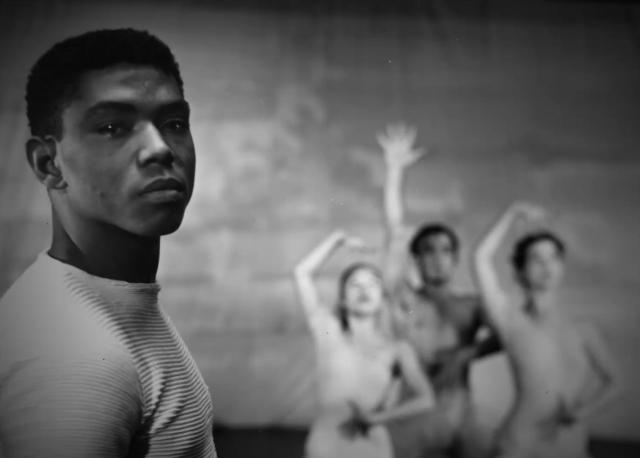
The life and career of Alvin Ailey is explored in new documentary opening in theaters July 23
AILEY (Jamila Wignot, 2021)
Angelika Film Center
18 West Houston St.
Film Society of Lincoln Center, Elinor Bunin Munroe Film Center, Howard Gilman Theater
144 West 65th St. between Broadway & Amsterdam Ave.
Opens July 23
neonrated.com/films/ailey
“We’re gonna do something, we’re gonna create . . . whatever it is, it gotta be good,” choreographer Rennie Harris says at the beginning of Ailey. The American Masters documentary, which opens July 23 at the Angelika and Lincoln Center, is good but sometimes overshadowed by how it could have been better.
Directed by Jamila Wignot’s (Town Hall, Walt Whitman) and edited by Annukka Lilja, the film cuts back and forth between rare archival footage of Alvin Ailey, who was born in Texas in 1931 and died from AIDS in 1989 at the age of fifty-eight; new interviews with former members of the Alvin Ailey American Dance Theater; and Harris and the company rehearsing Lazarus, the Philadelphia-born choreographer’s specially commissioned 2018 ballet celebrating the life and legacy of Ailey. “Mr. Ailey talked about blood memories — what his parents went through, what his parents’ parents went through, what his folk went through. And that was a major key for me — memory. That was the anchor,” Harris, the troupe’s inaugural artist-in-residence, explains about his motivation in creating the company’s first two-act ballet.
The film focuses on how Kennedy Center Honoree Ailey’s personal experiences directly impacted his work, from being raised by a single mother in difficult circumstances, to his homosexuality, to fighting racial injustice and being an important influence on the Black community, incorporating traditional African movement and American jazz to construct pieces unlike any ever seen before. “Alvin entertained my thoughts and dreams that a Black boy could actually dance,” former AAADT company member George Faison remembers. “It was a universe that I could go into, I could escape to, that would allow me to do anything that I wanted to.”
In a 1988 interview, Ailey says, “You have to be possessed to do dance,” and he was from an early age. The documentary includes clips from such works as 1958’s Blues Suite, a party set to traditional songs performed by Brother John Sellers; 1969’s Masekela Langage, which takes on racial violence and the prison system; 1971’s Cry, a solo for Judith Jamison that was a birthday present for Ailey’s mother; 1971’s Flowers, inspired by the life of Janis Joplin; 1979’s Memoria, a tribute to his late friend and colleague Joyce Trisler; and 1983’s Fever Swamp, Bill T. Jones’s athletic piece for six male dancers. The film also digs deep into Ailey’s most famous ballet, Revelations, the 1960 masterpiece that explores the richness of Black cultural heritage. “We didn’t have to go out on the street and protest; our protest was on the stage,” Faison says. “This was our march to freedom.”
In addition to Jones, Jamison, and Faison, also sharing stories about Ailey are current AAADT artistic director Robert Battle, original company member Carmen de Lavallade, former rehearsal directors and associate artistic directors Mary Barnett and Masazumi Chaya, stage manager and executive director Bill Hammond, and former company dancers Don Martin, Linda Kent, Sylvia Waters, Hope Clark, and Sarita Allen. Barnett calls Ailey’s dances “a reenactment of life,” while de Lavallade, who is shown dancing with Ailey back in the 1950s, notes, “Sometimes your name becomes bigger than yourself. Alvin Ailey — do you really know who that is, or what it is?”
The film would have benefited by Wignot (Town Hall, Walt Whitman) spending more time with Harris and the current Ailey dancers preparing Lazarus, which premiered in 2018 as part of the “Ailey Ascending” sixtieth anniversary season. The scenes were shot at the company’s home studio on West Fifty-Fifth St., a sharply white, brightly lit space with windows on two sides, in contrast to the grainy black-and-white videos and personal photographs tracing Ailey’s life and career that are spread throughout the film.
Last week, Rosalynde LeBlanc and Tom Hurwitz’s Can You Bring It: Bill T. Jones and D-Man in the Waters opened at Film Forum, a thrilling look at the 1989 dance by Bill T. Jones/Arnie Zane Company that dealt with the AIDS crisis; the documentary details the original conception of D-Man in the Waters while also following Loyola Marymount dancers as they get ready to perform the piece in 2016, as the directors zero in on humanity’s evolving relationship with tragedy and art across generations. In Ailey, that connection is much less clear, and the contemporary rehearsal scenes feel out of place, especially without the grand finale of a fully staged production of Harris’s homage. (You can watch a brief excerpt of Lazarus made during the pandemic here. AAADT will also be performing August 17-21 at the BAAND Together Dance Festival on Lincoln Center’s Restart Stage at Damrosch Park, featuring Lazarus and Revelations, and the company just announced that its annual New York City season will take place December 1-19 at City Center.)
Even so, Ailey offers a compelling portrait of one of the most important choreographers of the twentieth century, an extraordinary man who changed the way we look at dance and Black culture. Wignot will be at the Angelika for Q&As at the 7:30 screening on July 23 and the 12:45 show on July 24; she will also be at the Howard Gilman Theater at Lincoln Center for a Q&A with Battle, moderated by National Black Justice Coalition executive director David Johns, on July 23 at 6:15 and with Waters, moderated by author, professor, and Shubert board member Pamela Newkirk, on July 24 at 6:15.